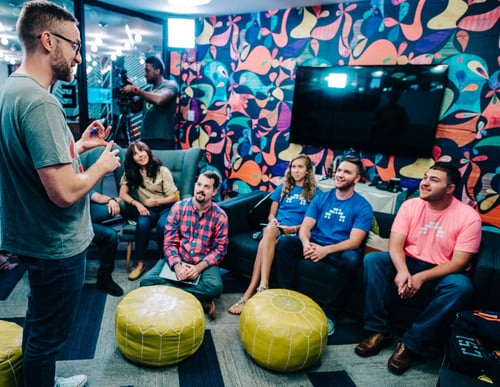Competitions are often used to build employee interest and awareness around a new program, platform or initiative. It’s a tactic that many of us have used, particularly when trying to engage employees with something that is perhaps a little dry.

Download the app and be entered into a prize draw to win an iPad!
10 employees who join the webinar will win a DoorDash voucher!
Sound familiar? We thought so!
But are competitions an effective way to build lasting engagement with a new program or initiative? This blog explores the benefits and risks of using competitions as employee incentives and offers three ways to ensure your competition doesn’t bite the dust.
The benefits of internal competitions
 Let’s face it, everyone loves an incentive. And a competition is a great way to encourage immediate action, such as logging into a new benefits platform or downloading an app. Even if the employee is only taking the action for a chance to win the prize, they're still participating and may see something that piques their interest along the way.
Let’s face it, everyone loves an incentive. And a competition is a great way to encourage immediate action, such as logging into a new benefits platform or downloading an app. Even if the employee is only taking the action for a chance to win the prize, they're still participating and may see something that piques their interest along the way.
Competitions can also help build a sense of community. An employee may notice the competition while browsing the intranet and then mention it to colleagues over lunch. Before you know it, excitement is starting to build around who will win the extra holiday leave or who is pocketing the new smartphone. “Did you hear about that new benefit they're talking about, Jack? It sounds pretty good.”
The process of entering a competition exposes the employee to information about the initiative, educating them about its benefits and building awareness. As straightforward as it might be for them to enter, it’s impossible for them to avoid learning something about the thing you’re trying to promote.
The competition creates a stage where you can proactively plug the initiative.
The risks of using internal competitions
 Despite the initial interest and excitement, a competition alone is not enough to guarantee lasting engagement or drive meaningful change.
Despite the initial interest and excitement, a competition alone is not enough to guarantee lasting engagement or drive meaningful change.
There’s a risk that employees are actually just engaging with the competition itself rather than your amazing new platform, campaign, employee app or whatever it is you’re promoting.
You might see a big spike in interest around the launch, but then minimal engagement or participation as time goes on.
Incentives are based on the theory of positive reinforcement, which suggests that offering a prize or reward after the desired behaviour has taken place will make the employee more likely to demonstrate that behaviour in the future. Like logging back into the new portal after the competition has finished, joining future employee webinars or continuing to use the new app.
But research shows that external incentives and rewards can have the opposite effect: External incentives, like the chance of winning a prize, can actually erode natural interest.
It’s called “the over-justification effect,” which occurs when a person’s motivation to perform a task is actually decreased when an incentive or prize is offered. So there’s a risk that the competition can devalue the thing it’s supposed to be promoting if employees assume it has little benefit to them outside of the chance of receiving a reward.
How to guarantee lasting engagement
While running a competition can be a great incentive to encourage initial engagement, the following tips will guarantee lasting engagement:
 1. Create something that adds real value
1. Create something that adds real value
It’s all well and good having a shiny and engaging comms plan to launch your new platform, initiative, benefit or app, but it’s impossible to achieve lasting engagement if the offering behind the noise does not add real value.
As Kevin Costner said, “Build it, and they will come”.
It’s important to create something that adds true value to employees’ lives and is worthy of their continued attention.
2. Harness the power of internal influencers
Nominating representatives in different departments to have a preview of the initiative creates an educated and enthusiastic army of “internal influencers” who will generate organic engagement among colleagues.
Put your arms around your internal influencers and “champions”. Invite them to take part in pre-launch focus groups, ask for their ideas around the launch messaging, and encourage them to spread the message far and wide.
3. Don’t let communications dry up after launch
To keep employees interested, messaging about the initiative must continue after the competition ends. Announcing the winners and then not communicating anything further will ensure employees completely forget about the thing the competition was supposed to promote.
Make sure you continue to be consistent and intentional with your internal communication around the topic.
The competition may get employees onto the boat, but it’s then your job to sail it.
For more tips, tricks and informed thought leadership about all things employee engagement, subscribe to our blog and never miss an update!
 Kaitlin Howes
Kaitlin Howes



